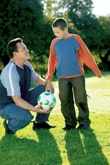Kids and Organized Sports

Millions of children play organized sports each year. The benefits are numerous and include fitness, friendships, commitment, teambuilding skills, and of course, fun. However, there are some potential problems as well: injuries, stress, and pressure, to name a few. When your child is ready for organized sports:
Start by thinking through the goals of having your child play. Is having fun the first thing that comes to mind? It should be. Children love sports because they are fun. Too often, this basic concept gets lost in the pressure to win or excel. While competing is part of athletics, and can provide much of the fun, sometimes the drive to win or excel can dampen the spirit of fun. There needs to be a balance.
After a game or practice, talk to your child about what he enjoyed and what he learned. Whether his team won or lost, or how well the team did (goals, runs, or baskets) is secondary. Emphasize the fun.
Think of sports as a way to start him on a life of physical fitness. Do you expect your child to become an Olympic athlete? In most cases, that would be unrealistic. But you do want him to become a healthy, physically active adult. Introducing him to the joys of physical fitness and the fun of competition at a young age can help him develop into a lifelong athlete.
Let your child participate in sports he wants to play. Let him chase his interests and encourage him to try lots of activities. Even if it becomes clear that your child is especially gifted at one sport, it is not good for him to concentrate year-round on a single activity. Having him play different sports in different seasons accomplishes these goals:
-
He will learn different skills (kicking and running in soccer, hand-eye coordination in baseball or softball).
-
Mixing up sports prevents injuries and burnout; too many young athletes develop overuse injuries and stress fractures from specializing in a sport or position too early for their growing bodies.
Once your child is in sports:
-
Be a good role model; let him see you exercising. Stay in shape and enjoy physical activities with your child.
-
Consider coaching his team, or at least volunteering to help at practices.
-
Go to his games and cheer, but do not criticize or coach. Follow the model set by good youth sports organizations and coaches: They Play. We Coach. You Cheer.
-
Balance the interests of your family as a whole with the demands of your child’s teams. Protect family dinners by eating together before or after practices, even if this is not your family’s regular mealtime. You can also ask the coach not to hold practice during dinner hours.
The statistics on physical activity in American children are not encouraging. Of the 20 to 30 million children who participate in youth sports programs, approximately 80 percent drop out by the age of 12. Only 3 percent of the population plays college sports of any type. Your positive parenting and supporting your child in sports will help him succeed. Let the games begin!
For more on sport safety, read Safety in Team Sports in Healthy Kids newsletter, Volume 7, Issue 3.
Continue to Traveling with your child
|